Web
and Book design, Copyright, Kellscraft Studio 1999-2008 (Return to Web Text-ures) |  (HOME) |
| SOME MAINE
CITIES WE shall not
enter
further into a description of delightful Portland,
since what we have said of it is all that our chief aim,
rural beauty,
will allow. Augusta, owing
to
its fine Bulfinch capitol of fair native granite, its age and other
attractions, must now have our attention. The capitol is located in a
manner to
set off advantageously its fine proportions. Happily the additions have
been
made in the spirit of the original. The edifice is nearly perfect in
its way,
for the purpose intended and for the state which it embodies. We show in Fort
Western a delightful reminder of the early days, when Augusta was a
trading
port. Mr. William H. Gannett deserves well of his city and state for
the
thoughtful, faithful, complete restoration as does also his technical
adviser,
Mr. George Francis Dow. We have nothing else of this sort restored for
us. It
may serve to give life to Parkman's histories which should be read here
in
preference to any other spot. The Plymouth Colony traded up the
Kennebec. The
Kennebec at Augusta has just the proper width for beauty. Looking up
from
Hallowell through good clusters of birches, the two towns are seen
together. The dignity of
Augusta, viewed from either bank, is striking. Here such brilliant men
as
Blaine and Bradbury made their homes. But there has been long a line of
people
of quiet cultivation and delightful home life to give tone to Augusta.
Here
also is, so some say, the noblest modern private residence in New
England. Here
a great dam on the river marks the limit of tidal water and provides a
basis
for that manufacturing which forms some part of the life of all Maine's
cities.
As a touring
center
Augusta has undeniable claims. It is here also that the peculiar
contour of the
fields formed by the quick dips of clay hills, is seen in perfection.
The
country is rich in green farms. Gardiner is a
thriving rival of Augusta, to the south, and Waterville to the north,
and each
is the center of alluring drives on both sides of the Kennebec.
Gardiner is the
point where ocean-going steamers must end their ascent of the river. It
is the
site of a home of old world dignity and stability, the noble Gardiner
mansion
still the center of a charming hospitality. The approaches along the
"outlet" to Winthrop pond, as we used in childhood to call the great
lake, is to be commended, as well as the drives to Richmond, Randolph
and
beyond. Indeed the east bank of the river where no cities are, is very
pleasing
for a long, long way. Waterville
derives
éclat from Colby University, and of course the city rejoices
in its river
power. Winslow with its Fort Fairfax, or the remnant of it, is
virtually a part
of Waterville, while Oakland is the other suburb. The Kennebec
from
Waterville to Richmond is a little empire of fair fields and trim homes
of
activity and alertness. It is one of the four groups which make the
body of
Maine's activities of the old sort, the others being Portland,
Lewiston-Auburn,
and Bangor. Bangor is really a center of all the Penobscot country,
with
Bucksport, Castine, Oldtown and Orono for its outposts. Thriving,
ambitious,
rich in resources, open to the sea, the base of the Aroostook and lake
district, it may well consider itself the second center in Maine, and
the first
in natural wealth. The great island above in the river with the
contiguous
waterways may have stimulated the development of the Oldtown canoe to
its
present perfection. Where would one live in Maine, if a choice lay open? A dangerous question, like choosing a wife. There are many calls and so many tastes that we must leave the matter open in some degree. If one desires the double advantage of salt and fresh waters, without urban conditions, several shore towns call us. We have named them. Portland is the supreme city for all attractions in Maine. The college towns of course appeal to the person who though out of school is always a student. Towns with mountains and lakes near are found satisfactory in every respect to not a few, who enjoy their work within sight of God's work. A river town is as rich as any in the variety of its possible routes, by land or water, in the association with worth-while people, and the opportunity for carrying on an occupation. Which river town? Oh! that would be telling. The one of course that feeds your nature and need and your loves most satisfactorily.
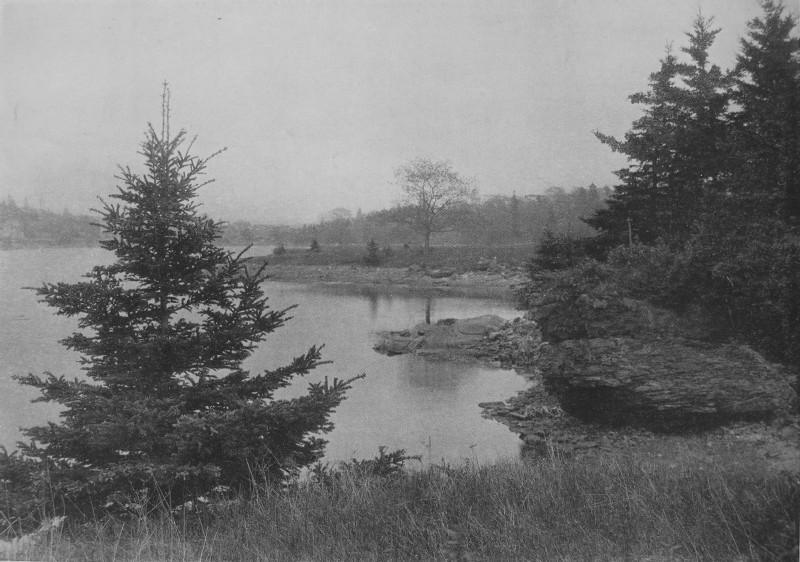 BETWEEN PINES - EAST BOOTHBAY  ELM GABLES - WATERBORO 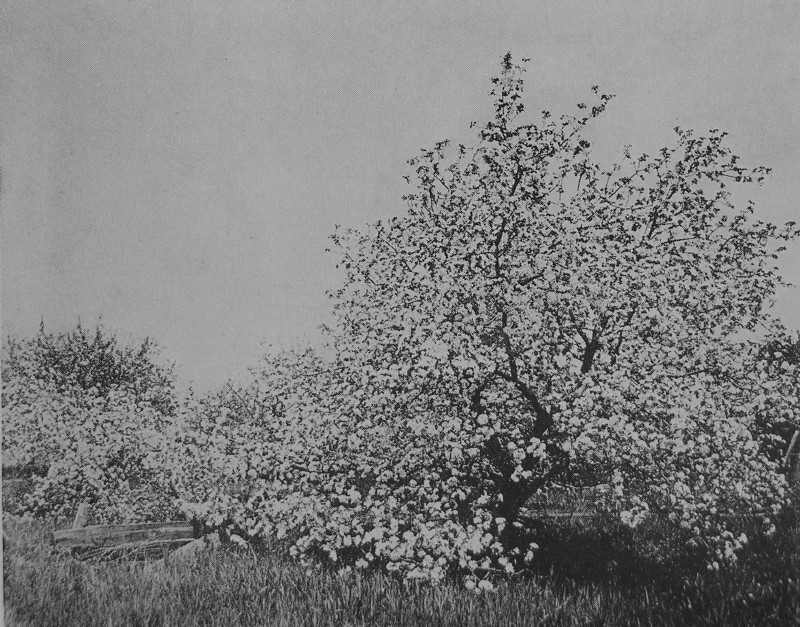 A SPRING WEDDING - ALNA 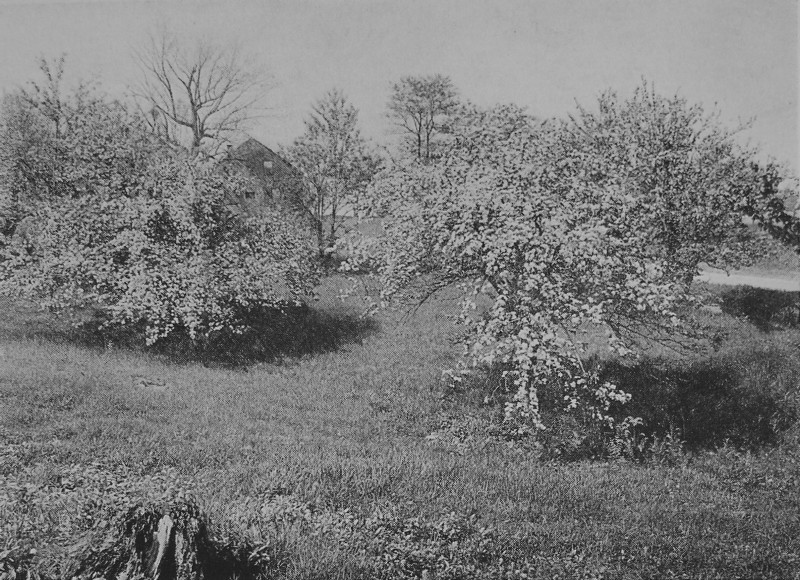 THE ORCHARD COTTAGE - RICHMOND 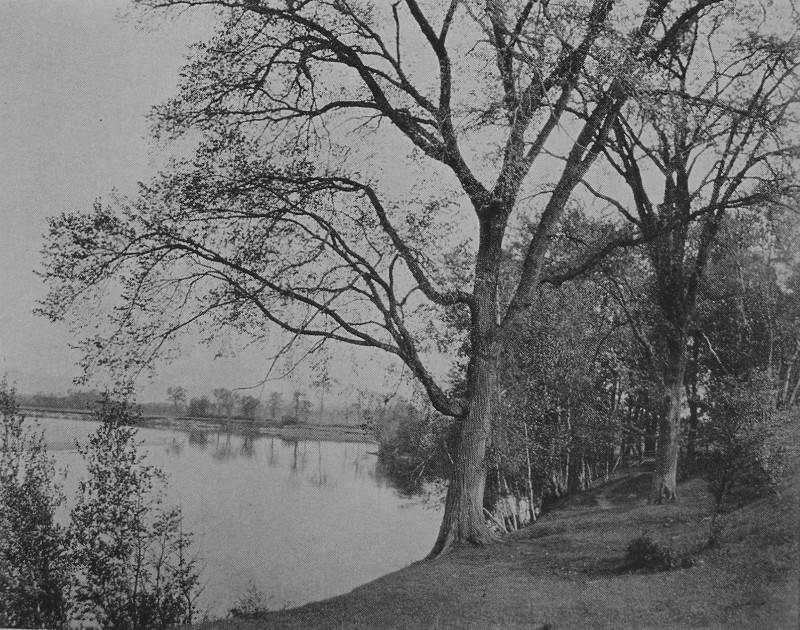 A PATH ON THE SACO - FRYEBURG 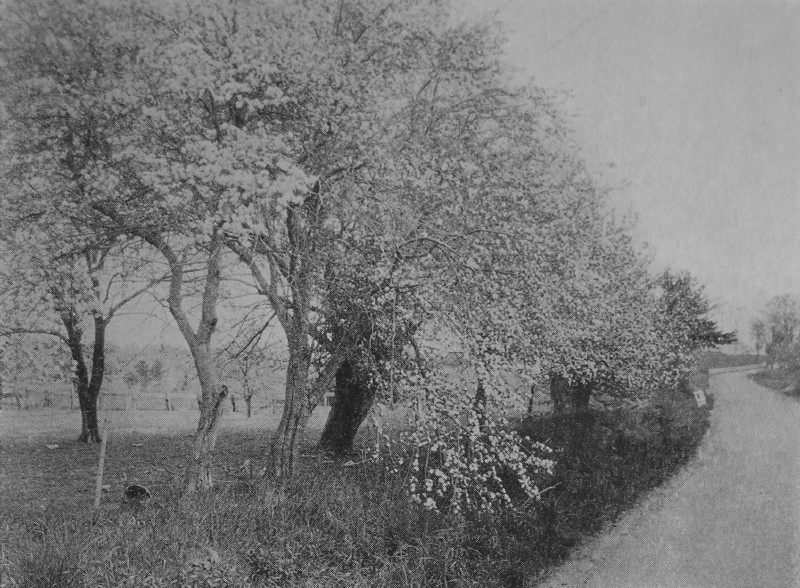 AN OPEN ROAD 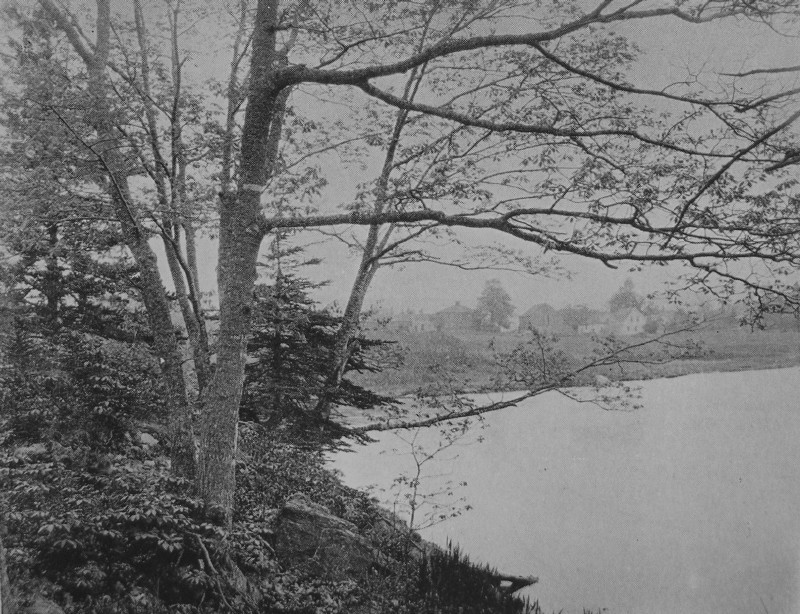 AN OLD SALT POND - EAST BOOTHBAY LET US GO DOWN INTO MAINE! WHERE Mount
Agamenticus calls us, and Cape Niddick and Ogunquit, and Webhannet, and
Kennebunk. From Bauneg Beg Pond to Mousam river and Alewives pond, let
us feel
at home at Goose Fair bay, and cross the river where the hen did at
Biddeford,
to reach Casco Bay. Up Merriconeag Sound we sail. We dodge Overset and
Bustling
and Stave islands, and make salute at Little Bang. We leave Rogue
island
behind, and doff our caps at Isaiah cove and Ministerial island.
Fearful of
Sister island, we run past Flying Point and Wolfe Neck, and up
Harraseekit
river, or Maquoit bay, to Bunganuc landing. Where Androscoggin bounds
Sagadahoc
we sail boldly on, leaving the islands, Bold Dick to wrestle with White
Bull
and Brown Cow, and refresh ourselves at Gooseberry island and Bald Head
cove.
At Sequin we glimpse Popham and the Kennebec. Let us fish in
the
waters of Cobbosseecontee, of Purgatory Pond or Winnegance bay. Let us
glide
through Fiddler reach, past Doughty point, or Widgeon cove to Hockamock
bay or
Nequasset brook, coming to rest on Mt. Ararat in Cumberland county. Let
us put
in a sentimental day at Loves brook or Knight pond, sailing on Nonesuch
river,
stopping at Dark harbor, or Half Moon pond, and resting at last on
Doddling
hill. Why not? Oh! let us go
down
into Maine, to Neontaquet river or Watchic pond, to peep through
Isinglass
hill, at Shy Beaver pond. Setting out from Brave Boat harbor, marking
progress
at Notched pond, hunting on Panther lake, let us pass the week-end at
Sabbath
Day lake or Jordan bay on Sebago, but writing home from Inkhorn brook,
and
renewing our flask at Powderhorn island. Dodging Folly and Rum islands,
we
shall naturally land at Bumpkin. We have nothing to do with Bareneck,
or
Spurwink river, as we prefer Oriocoag and Presumpscot rivers, and
Knubble bay.
Thomas. Great Toe we leave, with Cain pond, to find Pemaquid, oldest of
sites,
whence away to Souadabascook stream, Alamoosook lake, near the
Penobscot, for a
real fishing trip, there and on the Kenduskeag, or Sunkhaze stream or
Nehumkeag
pond. Let us go down
into
Maine! At Skowhegan and Norridgewock, in Indian wise we fish, and carry
to
Messalonskee lake, by Crooked river and Coffee pond, leaping Breakneck
brook,
we rest at Anonymous pond and wish they all had that name. For why is
Papoose
pond and Squapan lake, when the Indian lived who named Umbazookus,
Chemquassabumtook and Pattagumpus, "wonderful lakes of Maine?" While
Pataquongomis
and Penneseewasee, Passadumkeak and Sisladobsis remain, the waters of
Allaquash, Keoka, Masardis and Saboois seem tame. Let us go down into Maine! There only on Pocomoonshine and Meddybemps may we fish, there alone break on our ears the euphonious wave sounds of Pamedecook, of Moteseniock, of Parmachene, the beauties of Caucomgomock, of Musquacook and Maranacook, of Mopang and Madawaska and Mattagamonsis! From Rackabema and Wallagrass we pass in a maze to Casabexis, Seboomack, and run the rapids of Ripogenus and Ambajemackomus. We pause at the post office of Ko-dad-jo, and hasten to Macwahoc and Meduxikeag, to Skitiwok, and Nahmakanta lakes, for is not salmon there? Past Nolsemuck and Baskagegan to Pennaquam and Musquash, Madagascal and Gassabias, we paddle enraptured over Migarrawock and Umbajejus and cast anchor in Medunkeunk. At Mooselukmeguntic is hunting. At Annabessacook, Megunticook and Chesuncook all is well done. You know you are in Maine. A NATIONAL ASSET MAINE is a
present
or prospective joy to every intelligent citizen of our country. It is
becoming
the most attractive recreational district in the United States. We owe
it the
same attachment that we feel for our home grounds, since most of us,
when we do
have leisure, g0 to Maine. Its extent is
ample
for all visitors. Its appeals are various enough t0 attract every
taste. For in
Maine is lonely shore, lonely mountain and lonely lake and stream.
There is
also shore, lake, stream and mountain where society congregates. At
Poland, Bar
Harbor, and Mt. Kineo one may be luxurious. In the camps one may live
like an
Indian or even like a lazy poor white man. On the farms one may smell
the new
hay, wander over the berry pasture, enjoy the farm animals and study
the
economy of present day agriculture. In a village like Winthrop one is
in the
midst of orchards, convenient to lakes, by roads lined with the elm and
maple.
At Paris, in Oxford county, one is high above a fair country, and amid
conditions much as they used to be in old Maine. At Kingfield by the
cascading
Carrabasset we may drive many miles, returning filled with the joys of
that
lovely stream to our headquarters. At Strong, under the mountains, we
may revel
in their fine outlines or wander over their ruggedness, as the mood
suggests. At the
Rangeleys
there are all sorts of retreats, all near the bustle of the greater
hotels. At
Moosehead lake one need not proceed beyond Greenville for a most
satisfactory
base, with the beauty of Squaw mountain, Wilson pond and the gemmed
isles near.
Monson, and farther into the hills, at Onawa, we are in the center of a
region
altogether good and noble in its prospects. In Penobscot
and
Aroostook counties are camps as well provided as metropolitan hotels,
hard by
the freedom of leaping waters and slumberous mountains. Who could count
the
bays in Maine or find an end of those secluded, artistic, yet
accessible water
sites waiting for us to develop them, or to enjoy those already made
ready?
Maine holds everything in her great heart that the weary man or woman
could
desire — or should desire. The finest
pleasure
the writer derives from Maine is not its scenery, pleasing as that is,
or its
recreations, however various they may be. To talk with a farmer sitting
by the
open door, in the twilight while the blue and gold change in the soft
sky and
the trees whisper their evening goodnight, that is among the best of
joys. A day on a high
hill of Manchester, where the great farm house is open and gentle
sounds of
content reach us from the barns, this is enrichment, because it is
repeating
the experience of a myriad generations. To talk with a family who that
very day
has wrestled successfully with the land, and to note the sense of quiet
mastery, the knowledge of their own pleasure in their work is as good
as any
experience can be. What is the matter with the farm and the farmer?
Nothing
here. It is a good farm, a good farmer and a good farmer's wife. You
like it,
you cannot help admitting that here are the victors, here the sane
people, who
are in themselves the answers to the hectic unrest of our day. They read, they think, they talk well. They have tallied their opinions by their work, and both are good. We are tired of theories in this so speculative world. These farmers have "all the comforts of home,"— a good home with every modern convenience. There is electric light and power in house and barn. Warmth, cheer, a center for a calm and fair life is here. No use to upset the world for these people. They have acquired of the world, without cavil, all they need. Yes, they have good heads, else they could not have done all this. THE BRIDGE AT NEW VINYARD But does not a
successful merchant require a good head? Can a poor head make headway
in the
professions? Amid all the laments at the failures of farmers why does
not some
one point out that citizens in every calling fail, and fail so often
and so
completely that a farmers. failure is success in comparison. Now the finest
asset of a nation is the object lesson of men who succeed on the land.
Not
merely to keep the land and enrich it but to become broad and
intelligent at
the same time. Nations like
Rome
knew that the farmers of Italy were her hope and shield. Find then a
successful
Maine farmer and study him. He lives in the northern temperate zone
where
winters are cold. Neither he nor his are cold. He is able to know human
history, to enjoy nature, to mingle in the fellowship, religious or
scientific,
of the place, and of the larger center. What does he want, at least
what does
he need, more than he has? His needs indoors are neither more nor
different
from the city man's needs. And outdoors he of the country enjoys an
immense
advantage. So we believe,
from
experience, that Maine's chief asset is her people who have proved that
they
can live sanely, comfortably and as good citizens where they are, not
somewhere
else. There are some longings that prove shallowness, and some that
show a
vicious desire to collect a living without earning it. While millions
complain
that society and government is wrong, others, knowing the complaint to
be well
based, go forward and carve themselves out a life serene and rising.
They are
then, and all along their road, better able to assist in the evolution
of
better society. We are not
overlooking the shocking evils, the horrors of modern life. We are
recognizing
them fully. And we are pointing out that the hope of modern life, and
in fact
the only hope, is the steady going farmer, such as the one who is
making good
to-day in Maine. It is not the
nation's wealth in gold or manufactures that constitutes its assets. It
is the
men that live successfully, and help the rest of us to do the same. While millions
growl and thousands howl the only really successful men are saying
little for
publication and speak briefly in the town meeting. But when they talk
it is out
of knowledge. They know what they can do because of what they have
done. They
are constructive and they hold the world together. Some one has asked
whether
the delegates to our national nominating conventions consisted of men
who had
been successful at their work. The question was pertinent. What was
their work?
"Working" other men? Could any great number of them justify their
conscience for the outlay of time and money required by this
conventioning? Was
their time worth anything? What are they producing? They hired steam
noise
producers to help their hooting. That was the only production we heard.
The Maine
farmer,
say a thousand of him in that two weeks, produced on his farm a lot of
hay,
potatoes, strawberries, pork and — character. We put it last,
because
production guided by the producer makes character. And that poised,
strong,
kind, faithful character is the greatest production possible and the
lasting
asset for the nation. It can be drawn on at need. It is stronger than
the
federal bank, and will outlast Maine beautiful. A people who can make a state, can tame and comb it, can lift its materials into forms to fit human needs, a people who can make a state we love to live in are the only really rich possession of a nation.
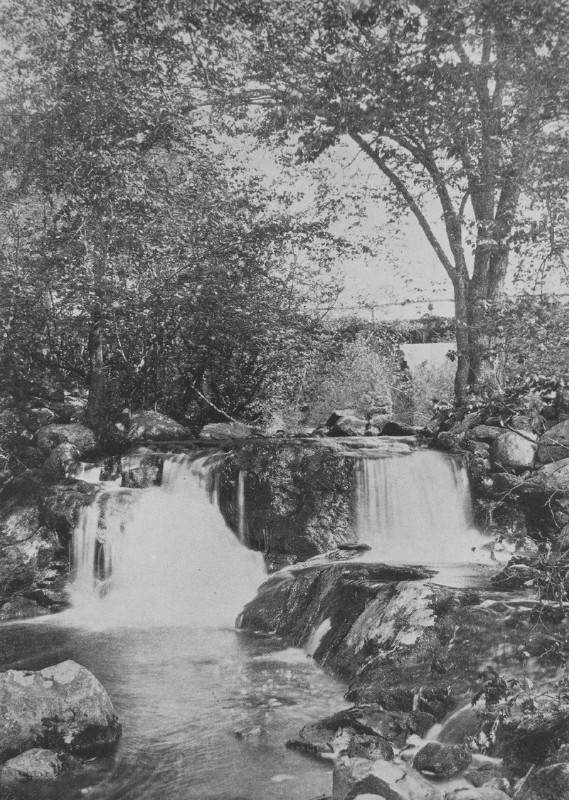 LITTLE TWIN CASCADES - DAMARISCOTTA 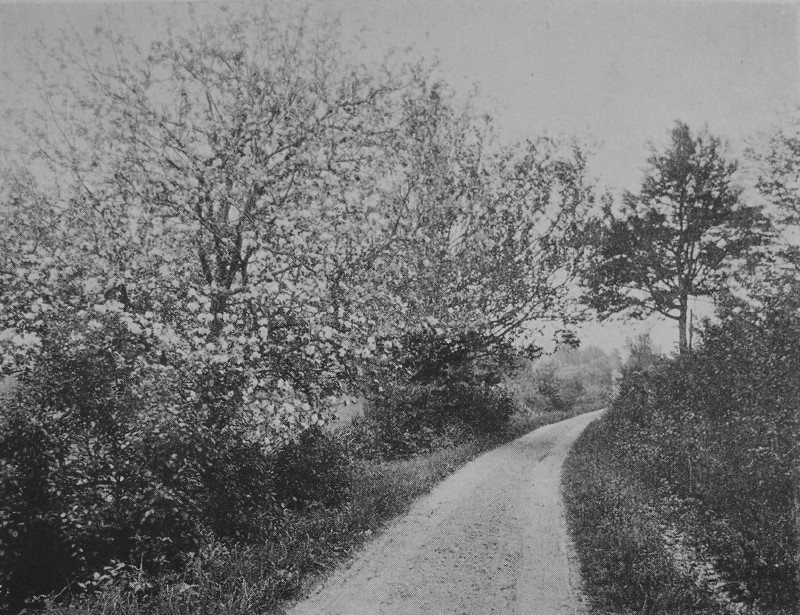 A DISAPPEARING CURVE 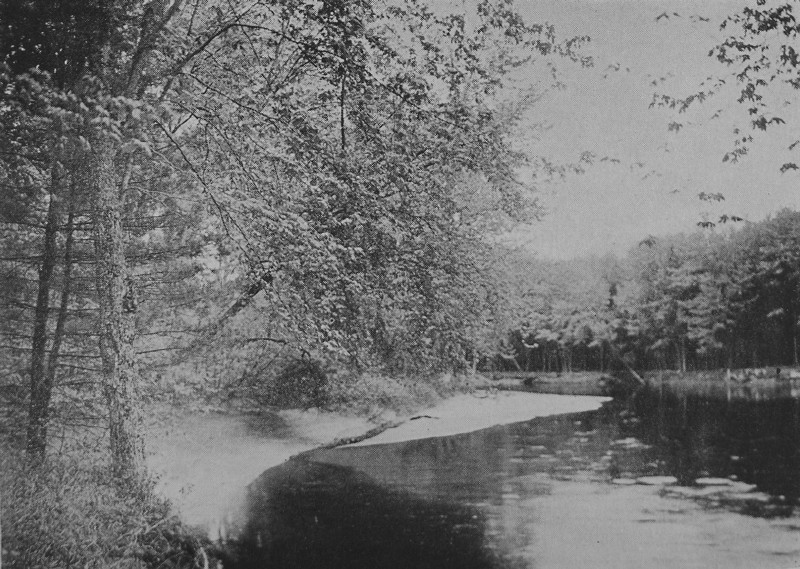 THE NARROWS - FRYEBURG 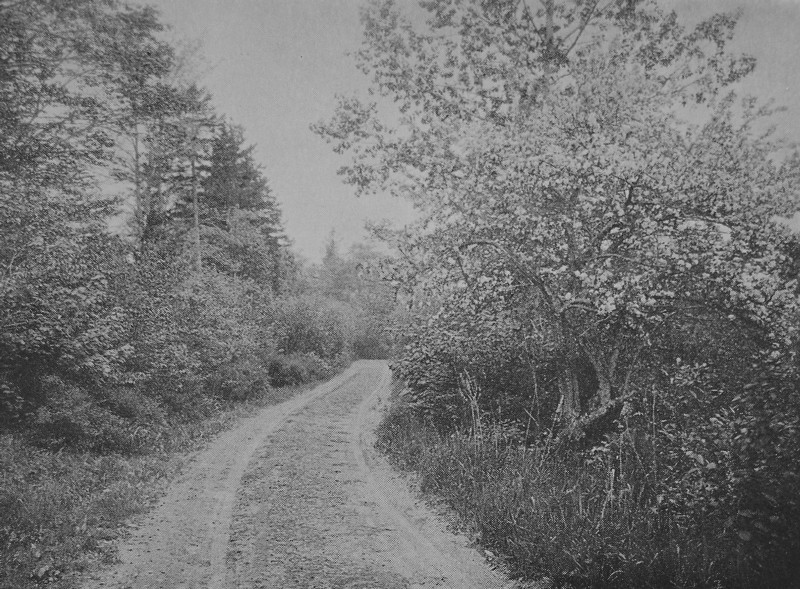 A BOOTHBAY BYROAD - EDGECOMB 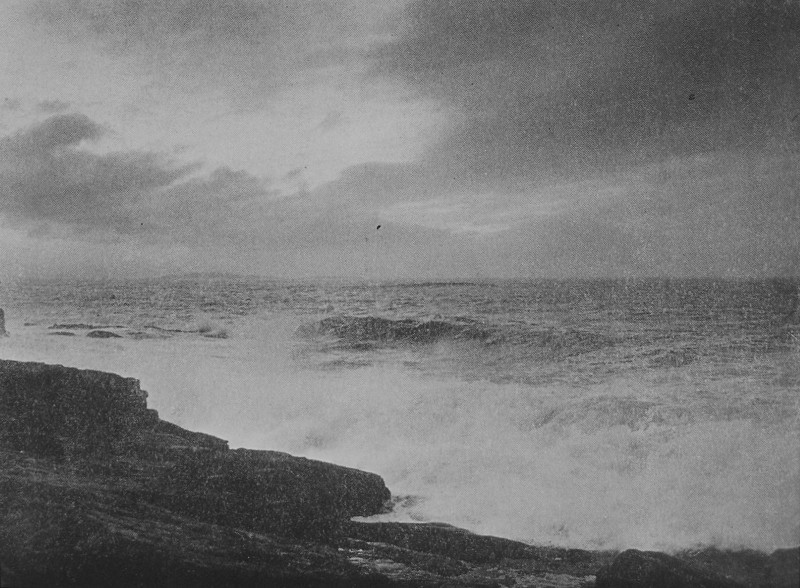 CLOUD MEETING SEA 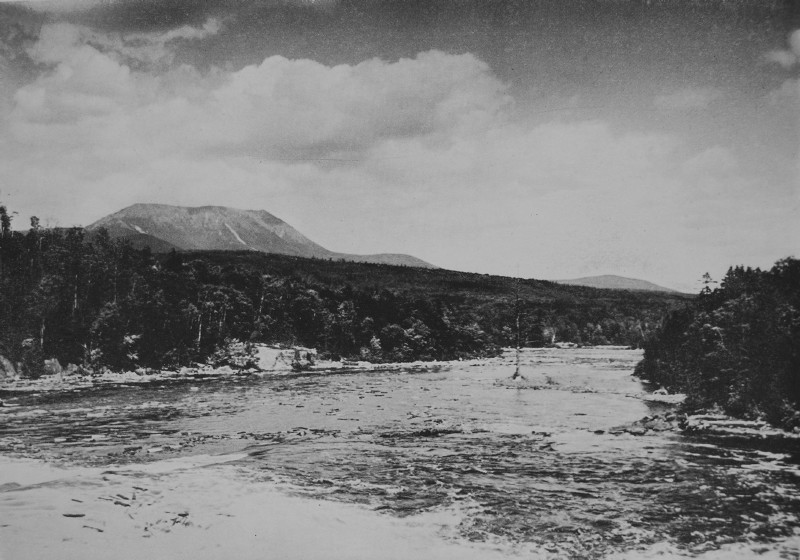 KATAHDIN FROM SOURDNAHUNK DAM SOMETHING NOT
BEAUTIFUL A RURAL
community
must work together more closely than a city community. As country
communities
unite in their granges they may also have religious communion by
uniting their
churches. One little Maine town has four church edifices but no church
organization. Some good man might now perhaps unite these people in
righteousness. Either pure paganism — if paganism is ever
pure — or union must
ensue. The inspiration
of
some mind, not our own, living and setting forth the higher aspects of
human
nature, and emphasizing from week to week such mellowness and
kindliness of
spirit as must obtain if society is to endure, is a crying necessity of
country
life. There are so many now who almost grow to manhood without one
noble appeal
made to their better natures that we tremble. The lifting
power
of a sane teaching in righteousness is too great to ignore. Country
churches in
Maine are largely going backward, and many are not going at all. Of
course many
of the old church edifices are not needed, now that we have better
roads.
Federated churches seem to answer the need. So few people these days
have any
denominational convictions that union is happily more possible than it
used to
be. The person who built himself a church where he maintains worship is
happily
an anomaly and a horrible example. In Maine nearly
"every prospect pleases." Some Maine farmers have made their farms
successful and they themselves are failures. The prevention is some
means to
carry new visions before the farmers. Moving pictures are new visions.
Whether
they are stimulants to honor and public spirit and purity we do not
know. We
strike no balance. But there never was a good people without a good
religion.
Unless the Maine farmer has an opportunity occasionally to forget
himself he
will not be worth remembering. Hitherto
denominations have counted for more in the eyes of their exponents, it
would
almost seem, than character. Those who believe in the beatitudes and
ten
commandments should get together to keep our rural states from being
merely
producers of pork, without principles. |